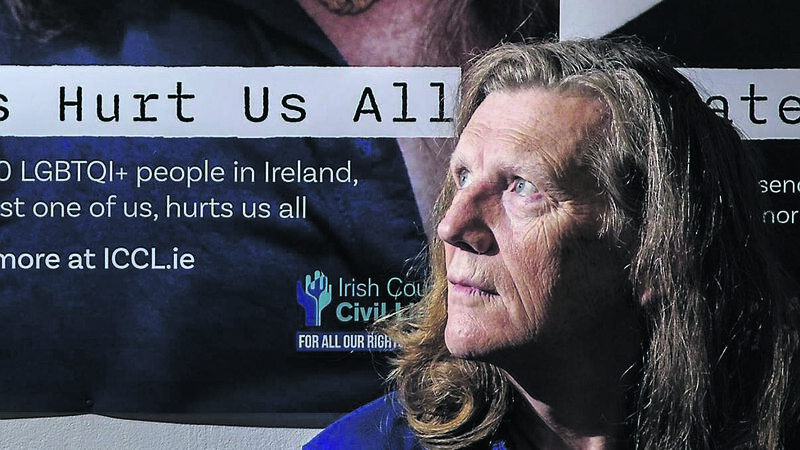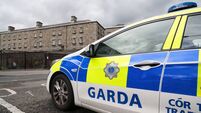People don't feel comfortable reporting hate crime incidents to guards, says Cork advocate

Ailsa Spindler of the Gay Project said the recorded figures did not align with the lived experience of LGBTQI+ people, and just underlined that very few incidents of hate crimes were being reported. Picture: Andres Poveda
A CORK LGBTQI+ advocate has said the latest hate crime statistics do not reflect the reality of the numbers of attacks experienced by victims of homophobic and transphobic hate crimes.
Figures published by An Garda Síochána this month show a 29% increase nationally in reports of hate crimes in 2022 but Cork city recorded a slight decrease in reported hate crimes during the same period.
Nationally, in 2022, 582 hate crimes and hate-related incidents were reported — a 29% increase on 2021.
Reported hate crime figures for Cork city are slightly down, with 38 hate crimes and hate-related incidents recorded for 2022, against 40 recorded for 2021.
An Garda Síochána policy states that hate crimes or hate incidents will be recorded and investigated as appropriate, “where it is perceived that the perpetrator’s hostility or prejudice against any person, community, or institution is on the grounds of the victim’s age, disability, race, colour, nationality, ethnicity, religion, sexual orientation, or gender”.
A total of 617 discriminatory motives were recorded nationally in 2022, up from 483 in the previous year, with the most prevalent discriminatory motive race, 32%, followed by sexual orientation, 22%, and nationality, 21%.
Hate motives were evident in a range of incidents nationally in 2022, the largest percentage being public order (30%), minor assaults (20%), assault causing harm (9%), and criminal damage (8%).
The largest proportion of hate-related incidents, 47%, reported in 2022 occurred in the Dublin Metropolitan Region, with 15% reported in the Southern Region, 20% reported in the North-Western Region, and 18% reported in the Eastern Region.
In the Cork City division, 38 hate crimes and hate-related incidents were recorded, with 17 crimes recorded as public order offences and 11 as minor assaults. No discriminatory motivations were recorded.
In 2021 there were 40 reported hate crime and hate-related incidents in Cork city, with 12 classified as public order offences, and in 13 cases the discriminatory motive was listed as race-related.
None of the hate-related incidents reported in Cork city in 2021 had gender or sexual orientation listed as the motive.
In the Cork North division, 14 hate crimes and hate-related incidents were recorded in 2022, with no further details recorded, and no hate crimes or hate-related incidents were recorded in the Cork West division in 2022.
FEW INCIDENTS BEING REPORTED
Ailsa Spindler of the Gay Project said the recorded figures did not align with the lived experience of LGBTQI+ people, and just underlined that very few incidents of hate crimes were being reported.
“I don’t think we can be happy that the numbers are low, because I don’t think the figures reflect reality at all, in fact rather I think it just highlights the fact that people, for a number of reasons don’t want to, or don’t feel comfortable, reporting these sort of incidents to the guards,” Ms Spindler said.
Ms Spindler said the Gay Project and other LGBTQI+ agencies in Ireland were currently looking at a number of approaches, including an information campaign encouraging people to use support charities as third-party reporters.
“If we are third-party reporters, that means people who have suffered hate crimes can come to us and we can report the complaints, or we can arrange for guards to come to our premises and people can report the crime in perhaps a safer space than perhaps they might feel, say, Anglesea Street would be,” Ms Spindlersaid.
“There are other possible initiatives, one would be to actually broaden it out and say this is to do with the stigma that people still feel is attached to sexual orientation and gender identity differences, and that would be a bigger campaign, to educate people to say: ‘Be an ally to your LGBTQI+ friends.’”
Ms Spindler, whose pronouns are they and them, made their remarks during what is the 30th anniversary of the decriminalisation, in 1993, of homosexuality in Ireland, and then only because Senator David Norris took a case to the European Court of Human Rights, shaming the country to step reluctantly out of the Victorian era.
“An allyship campaign, or an advocacy campaign, is about encouraging people who may not be themselves be part of the community to actually stick up for the community, and this would create an environment where, first of all, attacks would go down, but also that when attacks happen, people would feel able to talk it through with friends, family, work colleagues, and so on, and not feel that it was something to have to feel ashamed of,” Ms Spindler said.
Ms Spindler said the Hate Crimes Bill is slowly making its way through the parliamentary process, meaning that those convicted of hate crimes would face additional penalties, but, they warned, this would be meaningless if people were too fearful to report those crimes.
“This is why we and other organisations are looking at ways of improving the reporting of hate crimes, and that is through improving the support that is there for people who are victims,” Ms Spindler said.
- info@gayproject.ie










 App?
App?


